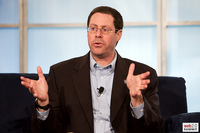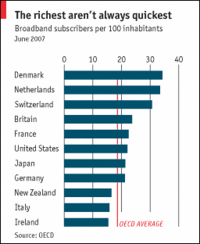
Andrew Odlyzko asks what if the duopoly gets its way and completely
does away with net neutrality:
But what if they do get their wish, net neutrality is consigned to the
dustbin, and they do build their new services, but nobody uses them? If
the networks that are built are the ones that are publicly discussed,
that is a likely prospect. What service providers publicly promise to
do, if they are given complete control of their networks, is to build
special facilities for streaming movies. But there are two fatal defects
to that promise. One is that movies are unlikely to offer all that much
revenue. The other is that delivering movies in real-time streaming mode
is the wrong solution, expensive and unnecessary. If service providers
are to derive significant revenues and profits by exploiting freedom
from net neutrality limitations, they will need to engage in much more
intrusive control of traffic than just provision of special channels
for streaming movies.
—
The delusions of net neutrality,
Andrew Odlyzko,
School of Mathematics, University of Minnesota Minneapolis, MN 55455, USA odlyzko@umn.edu http://www.dtc.umn.edu/odlyzko Revised version, August 17, 2008
Why is that?
But video, and more generally content (defined as material prepared by
professionals for wide distribution, such as movies, music, newscasts,
and so on), is not king, and has never been king. While content has
frequently dominated in terms of volume of traffic, connectivity has
almost universally been valued much more highly and brought much higher
revenues. Movies cannot be counted on to bring in anywhere near as much
in revenues as voice services do today.
The Internet isn't about Sarnoff's Law (broadcast content like TV, radio, and newspapers)
or even about Metcalfe's Law (1-n connectivity, like telephone or VoIP):
it's about Reed's law,
2n-n connectivity, such as blogs, P2P, and facebook).
That's my interpretation;
Odlyzko probably wouldn't agree.
Anyway, that video content such as movies is king is one of the primary
delusions Odlyzko addresses in this paper.
The other is that movies need to be streamed in realtime.
It is mysterious why people continue to believe that in the face of the massive
evidence BitTorrent and other P2P services that deliver big content
in chunks faster than realtime.
I can only attribute this second delusion
to a bellhead mindset that still thinks in
terms of telephone, which was realtime because nobody knew any other
way to do it back in the analog-copper-wire-connection day.
As Odlyzko sums it up:
The general conclusion is that the story presented by service providers,
that they need to block net neutrality in order to be able to afford
to construct special features in their networks for streaming movies,
is simply not credible. If lack of net neutrality requirements is to be
exploited, it will have to be done through other, much more intrusive
means.
So why let the duopoly force a policy on everyone else that won't even work
to the advantage of the duopoly?
One way to get net neutrality would be to let the duopoly have its way,
and wait for it to implode.
However, given that for streaming video to have any chance of succeeding,
the duopoly would have to clamp down on everything else to eliminate
any competition, I shudder to think what this would mean.
The Internet as a source of real news and opinion would go away.
Given that the vestigial traditional news media in the U.S.
(TV, radio, newspapers) provide so little news, there's a very
good chance that most people in the U.S. wouldn't even know
how bad they had it as the country sped its slide into parochialism
and irrelevance.
How many people even know now that the U.S. has slid from #1 to #23
or whatever the latest number is in broadband uptake?
If the duopoly is given its head, even fewer would know.
If we let King Kong Telco and T Rex Cableco battle it out to be
Movie King of the Internet, where does that leave poor Fay Wray Public?
FCC, FTC, Congress, executive, and courts, not to mention the public,
should all read Odlyzko's
paper, and should all refuse the duopoly's demand for special
privileges that won't even produce profits for the duopoly.
Then all of above should legislate, enforce, and maintain
net neutrality so we will all profit and benefit.
Yes, even the duopoly can win with this.
-jsq
 The world has turned upside down:
The world has turned upside down:








